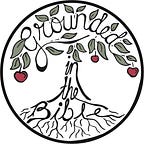If you want to receive Grounded in the Bible’s weekly Bible studies in your inbox each week, you can subscribe here! Join us as we "grow in the grace and knowledge of our Lord and Savior Jesus Christ."
Last week, we looked at the context of Jesus’ claim that “I AM the bread of life.” Jesus had just fed a large crowd with only 5 small loaves of bread and 2 fish. After the crowds searched for him the next day, Jesus accused the crowds of following him not for who he is but only because he can fill their stomachs.
Jesus then started talking about bread from heaven, and immediately the people equated this to the manna that God sent to the Israelites in the wilderness. They want this bread from heaven! Yet they don’t appear to really understand what this means. This week, we’ll explore more closely what Jesus really meant by his statement, “I AM the bread of life.”

3. What do we learn about Jesus from this statement?
Jesus made several statements throughout John 6 that lead to some very clear conclusions. Let’s see if we can draw some lines between the dots that Jesus gives us.
John 6:27: “Do not work for food that spoils, but for food that endures to eternal life, which the Son of Man will give you. For on him God the Father has placed his seal of approval.”
There is food that leads to eternal life.
The Son of Man will give that food.
God the Father has placed his seal of approval on the Son of Man.
John 6:29: “The work of God is this: to believe in the one he has sent.”
God is sending someone.
Our responsibility is to believe in the person God sends.
John 6:32b-33: “It is my Father who gives you the true bread from heaven. For the bread of God is the bread that comes down from heaven and gives life to the world.”
The Father gives bread from heaven, also called the bread of God.
This bread that comes from God gives life to the world.
So Jesus is making connections: Now we know that whoever God is sending is this “bread,” and it is this bread that gives life.
Then Jesus hits them with:
John 6:35: “I am the bread of life. Whoever comes to me will never go hungry, and whoever believes in me will never be thirsty.”
There’s no ambiguity here. This bread from heaven, the one that Jesus says God is sending, the one who will bring life—that’s Jesus. That also means that Jesus is the Son of Man, he has come from heaven, and God the Father has placed his seal of approval on him. If all this is true, then Jesus is calling them to believe in him as the one the Father has sent. This is what Jesus is saying with this statement.
What does Jesus say next?
John 6:37-40: 37 “All those the Father gives me will come to me, and whoever comes to me I will never drive away. 38 For I have come down from heaven not to do my will but to do the will of him who sent me. 39 And this is the will of him who sent me, that I shall lose none of all those he has given me, but raise them up at the last day. 40 For my Father’s will is that everyone who looks to the Son and believes in him shall have eternal life, and I will raise them up at the last day.”
God has a plan for who will believe in Jesus, and Jesus will accept those.
Jesus came down from heaven to do God’s will.
God’s will is that Jesus will not lose any that God has given to him.
God’s will is that Jesus will raise up all who believe on the last day.
God’s will is that everyone who looks to Jesus and believes in him will have eternal life.
This is quite the claim. Look at the authority and power that Jesus is claiming here. He’s talking about having a role in giving eternal life to those who believe in him and raising them up on the last day. This isn’t just providing food or healing sickness. This is real power for eternity.
After the Jews express their disbelief that someone they know could have this type of power, Jesus reiterates his claim.
John 6:44-51: 44 “No one can come to me unless the Father who sent me draws them, and I will raise them up at the last day. 45 It is written in the Prophets: ‘They will all be taught by God.’ Everyone who has heard the Father and learned from him comes to me. 46 No one has seen the Father except the one who is from God; only he has seen the Father. 47 Very truly I tell you, the one who believes has eternal life. 48 I am the bread of life. 49 Your ancestors ate the manna in the wilderness, yet they died. 50 But here is the bread that comes down from heaven, which anyone may eat and not die. 51 I am the living bread that came down from heaven. Whoever eats this bread will live forever. This bread is my flesh, which I will give for the life of the world.”
Jesus repeats that God the Father is responsible for choosing who believes in Jesus and who Jesus will raise up on the last day.
Jesus says that only the one who is from God has seen the Father, and we already know that Jesus has claimed that God has sent him. This means that Jesus is claiming that he has seen the Father.
Jesus repeats that the one who believes in this one that God has sent—Jesus—will have eternal life.
Jesus repeats that he is the bread of life—the living bread—and anyone who eats this bread will live forever.
Then Jesus throws one more nugget of truth their way: Jesus will give his flesh—which he calls the bread—for the life of the world.
This throws up all kinds of red flags for the Jews. If they are supposed to eat the bread, and the bread is Jesus’ flesh, that’s a little disturbing. Are they really supposed to eat his flesh?
Then Jesus goes on to drive his point in even further.
John 6:53-58: 53 Jesus said to them, “Very truly I tell you, unless you eat the flesh of the Son of Man and drink his blood, you have no life in you. 54 Whoever eats my flesh and drinks my blood has eternal life, and I will raise them up at the last day. 55 For my flesh is real food and my blood is real drink. 56 Whoever eats my flesh and drinks my blood remains in me, and I in them. 57 Just as the living Father sent me and I live because of the Father, so the one who feeds on me will live because of me. 58 This is the bread that came down from heaven. Your ancestors ate manna and died, but whoever feeds on this bread will live forever.”
Jesus tells them they must eat his flesh and drink his blood. This is what will give them eternal life and will cause them to be raised up on the last day.
Jesus sneaks in a little of the concept of remaining in him—we remain in Jesus as we eat his flesh and drink his blood. If we feed on him, we will live forever.
This sounds really gross. It sounds like cannibalism. And I’m sure the Jews were even more disturbed, because the Law commanded them not to consume blood (Leviticus 17:10-14, Deuteronomy 12:23-25).
Also, we never have any record in the Bible of people literally eating Jesus’ flesh or drinking his blood. So what does this really mean?
Jesus was using this as a metaphor: What we eat and drink spiritually should be Christ and his Word. This is what nourishes our souls and draws us closer to him. He clarifies that for his disciples later in the story.
John 6:63: “The Spirit gives life; the flesh counts for nothing. The words I have spoken to you—they are full of the Spirit and life.”
If we eat bread, it will fill our bellies. In the same way, if we eat the bread of life—if we believe in Jesus and listen to his words—we will be filled with the Spirit, who gives us eternal life.
We also see this picture of flesh and blood given in the practice of communion, when we remember the sacrifice that Jesus made on the cross.
1 Corinthians 11:23-26: 23 For I received from the Lord what I also passed on to you: The Lord Jesus, on the night he was betrayed, took bread, 24 and when he had given thanks, he broke it and said, “This is my body, which is for you; do this in remembrance of me.” 25 In the same way, after supper he took the cup, saying, “This cup is the new covenant in my blood; do this, whenever you drink it, in remembrance of me.” 26 For whenever you eat this bread and drink this cup, you proclaim the Lord’s death until he comes.
4. How should we respond?
What will you do with the claim that Jesus is the bread of life? Will you be like the Jews and grumble in disbelief? Will you turn away and no longer follow? Or will you believe that Jesus is who he claims to be?
Jesus gives us the call to believe in him—in the bread of life that God Himself has sent. Jesus came to give his life so that everyone who “eats his flesh and drinks his blood”—everyone who believes in him and who listens to his words—will receive the Spirit and have eternal life.
What will your choice be?













